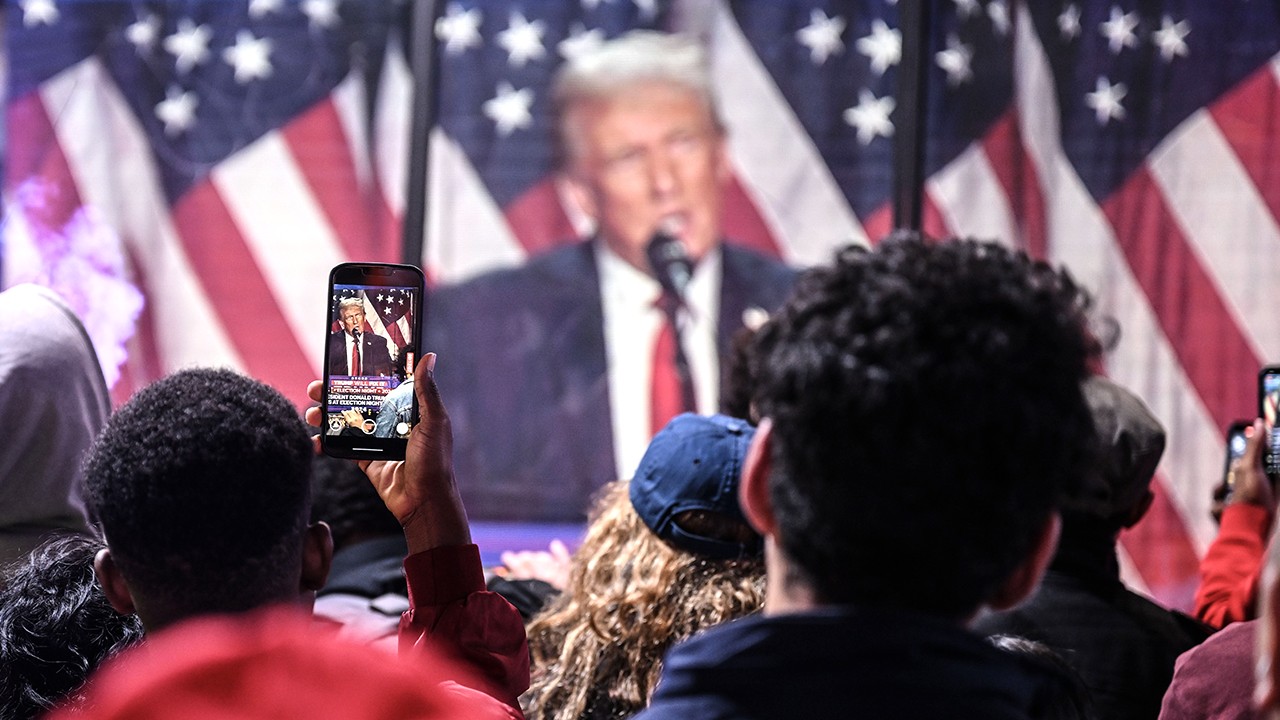Donald Trump’s resounding victory in the November 5th presidential election signals a significant shift in American politics and policy. As he prepares to implement far-reaching changes both domestically and internationally, it’s crucial to understand the motivations and beliefs of his supporters. Why do millions of Americans continue to rally behind Donald Trump? Drawing on data from Pew Research Center’s pre-election surveys conducted throughout the past year, we delve into the core values and concerns of Trump’s voter coalition to understand the enduring appeal.
Trump: The Change Agent
A central theme resonating with Trump’s base is the desire for radical change. An October survey revealed that a significant majority (86%) of Trump supporters believed he would bring positive change to Washington. This perspective positions Trump as an outsider, a disruptor of the political establishment, which is a key element of his appeal for those disillusioned with the status quo. Conversely, only a small fraction (12%) of his supporters thought he would maintain the existing political landscape. Interestingly, while supporters of Kamala Harris anticipated change under a Trump presidency, an overwhelming 92% feared it would be for the worse, highlighting the deeply polarized views surrounding his potential impact. This perception of Trump as a catalyst for change, whether positive or negative, underscores his position as a transformative figure in the eyes of both his followers and detractors.
Economy and Immigration: Top Priorities for Trump Voters
Similar to the 2020 election cycle, the economy remained the paramount concern for Trump voters in 2024. A September survey indicated that an overwhelming 93% of Trump supporters considered the economy “very important” to their vote. This consistent focus on economic issues underscores the importance of financial well-being and opportunity for Trump’s base.
However, a notable shift emerged with immigration rising as a critical issue. In 2024, 82% of Trump voters rated immigration as “very important,” a substantial increase from 61% in 2020. This surge suggests a growing concern over border security and immigration policies within Trump’s coalition, potentially fueled by increased media attention and political discourse surrounding these topics. While issues like climate change (11%), racial and ethnic inequality (18%), and abortion (35%) were considerably less important to Trump voters, the dominance of the economy and immigration highlights the core pillars of their political concerns.
Cultural Values: Key Areas of Agreement for Trump’s Base
Beyond economic and immigration concerns, Trump supporters exhibit strong unity on several cultural issues, as revealed in polls conducted throughout 2024. These shared beliefs contribute significantly to the cohesive nature of his base and explain part of the strong affinity they feel for his political stance. According to Pew Research Center data, there is widespread agreement among Trump supporters on the following:
- Biological Sex: An overwhelming 92% believe that biological sex is determined at birth and immutable. This perspective reflects a traditional view of gender identity and a rejection of more fluid interpretations.
- Gun Ownership: A strong majority (89%) believe that gun ownership enhances personal safety rather than diminishing it. This aligns with a pro-Second Amendment stance and emphasizes the importance of self-defense rights.
- Criminal Justice System: A significant 83% perceive the criminal justice system as insufficiently tough on criminals. This viewpoint suggests a desire for stricter law enforcement and harsher penalties for criminal offenses.
- Legacy of Slavery: A substantial 75% believe that the historical legacy of slavery has minimal impact on the current position of Black people in American society. This perspective downplays the systemic and historical factors contributing to racial inequality.
These culturally conservative positions resonate deeply with a significant segment of the American population and contribute to the strong bond between Trump and his supporters. These stances often stand in stark contrast to the views held by supporters of his political opponents, further solidifying partisan divides on cultural matters.
Interestingly, on issues like the impact of women’s gains on men (71% don’t see it as detrimental) and the separation of religion and government (55% favor separation), Trump supporters’ views present a more nuanced picture, challenging simplistic assumptions about their beliefs. However, the strong consensus on core cultural issues remains a defining characteristic of this voter group.
Views on Government and Social Security
Long-standing ideological differences between Republicans and Democrats regarding the role and size of government were again evident in the 2022 election cycle. Trump supporters largely favor a smaller government with reduced social programs, yet they also want to protect existing entitlements like Social Security. This seemingly contradictory stance reveals a complex set of beliefs about government intervention and individual responsibility.
For instance, a significant 72% of Trump supporters believe that aid to the poor does more harm than good, reflecting a concern that such programs can create dependency and disincentivize self-reliance. In stark contrast, only 18% of Harris supporters shared this view, highlighting the deep partisan divide on the role of government in addressing poverty.
However, despite their preference for limited government, strong majorities of both Trump (77%) and Harris supporters (83%) opposed any cuts to Social Security. This widespread opposition to Social Security reductions underscores the program’s popularity and its perceived importance as a safety net for older Americans. This suggests that while Trump’s base generally favors fiscal conservatism, they also prioritize protecting established social programs that benefit a broad segment of the population, including themselves.
Dissatisfaction with National Conditions
A significant driver of Trump’s appeal is the pervasive dissatisfaction among his supporters with the state of the nation. In the lead-up to the election, a striking 95% of Trump supporters expressed dissatisfaction with the direction of the country. This widespread pessimism reflects a sense of unease and frustration with current conditions, potentially encompassing economic anxieties, cultural concerns, and a feeling that the country is on the wrong track. In September, a staggering 89% voiced strong concern about rising food and consumer goods prices, highlighting economic anxieties as a key component of this dissatisfaction.
While Harris supporters also expressed broad dissatisfaction, it was less intense, with 60% reporting dissatisfaction and 62% expressing concern about prices. This difference in the depth of dissatisfaction underscores the intensity of negative sentiment within Trump’s base and their desire for a significant change in leadership and policy direction. This widespread negative perception of national conditions creates fertile ground for a candidate promising radical change and a return to a perceived better past, which resonates strongly with Trump’s supporters.
This trend of economic pessimism is not unique to the United States, with global surveys revealing widespread negative economic sentiment across numerous countries. In many nations, as in the U.S., dissatisfaction with the economy is significantly higher among those who do not support the ruling political party, indicating a common pattern of partisan divergence in economic perceptions.
Policy Clarity in Trump’s Messaging
Another factor contributing to Trump’s support is the perception that he clearly articulates his policy positions. In October, an overwhelming 94% of Trump supporters stated that he had clearly explained his policies for addressing illegal immigration. Similarly, large majorities felt well-informed about his plans for the economy and foreign policy. While healthcare lagged slightly, a still-significant 58% believed they understood his healthcare proposals.
In contrast, Trump supporters perceived Harris’s policy positions on issues like immigration and the economy as less clear. This perceived clarity in Trump’s messaging, even if debated by others, provides his supporters with a sense of understanding and confidence in his leadership and proposed solutions. This clarity, whether real or perceived, can be a powerful motivator for voters seeking decisive leadership and straightforward policy approaches.
Acceptable and Unacceptable Actions for Trump
When considering Trump’s potential actions in office, his supporters draw a clear line between what they deem acceptable and unacceptable. A September survey explored their views on some of the more unconventional steps Trump suggested he might take early in his term.
A majority (58%) found it acceptable for Trump to utilize executive orders to enact policies if Congress proved obstructive. Similarly, 54% considered it acceptable for him to direct federal law enforcement to investigate his Democratic political rivals. These figures suggest a willingness among a segment of Trump’s base to support assertive, even controversial, tactics to achieve his political objectives.
However, clear boundaries exist. A majority (58%) deemed it unacceptable to fire government employees for lacking loyalty to him, and 57% opposed pardoning friends or supporters convicted of crimes. These limits indicate that while a portion of Trump’s base may condone aggressive political maneuvering, they still value principles of fairness and accountability, even from their preferred leader.
The Call for Unity
Despite strong partisan divisions, there is an underlying desire for unity among Trump’s supporters. In October, a resounding 86% expressed the view that Trump, if elected, should prioritize addressing the concerns of all Americans, not just his own base, even if it meant disappointing some loyal supporters. This sentiment suggests a recognition of the need for broader national healing and a desire for Trump to act as a president for all citizens, at least in principle.
Furthermore, in September, 70% of Trump supporters agreed that the next president should collaborate with the opposing party in Congress. In October, an identical proportion believed this to be at least somewhat likely under a Trump presidency, although only 19% considered it “very likely.” This indicates a pragmatic understanding of the need for bipartisan cooperation in governing, even amidst deep political polarization. While strong partisan loyalty is a hallmark of contemporary American politics, these findings suggest that even within Trump’s base, there is an underlying recognition of the importance of unity and compromise in effectively leading a diverse nation.
Conclusion: Decoding Trump’s Enduring Appeal
In conclusion, understanding why people continue to support Donald Trump requires examining a confluence of factors. His image as a change agent resonates deeply with voters seeking to disrupt the political establishment. Concerns about the economy and immigration remain paramount, driving many to seek decisive action on these fronts. Strong alignment on cultural values, particularly regarding gender, gun rights, and criminal justice, solidifies his base among culturally conservative voters. Widespread dissatisfaction with national conditions fuels a desire for radical change and a yearning for a perceived better past. Trump’s perceived clarity in policy messaging provides a sense of confidence and understanding for his supporters. Finally, despite partisan divides, there’s an undercurrent of desire for unity and a recognition of the need for broader national leadership, even within Trump’s dedicated base. These interwoven factors offer a comprehensive picture of the key drivers behind the enduring appeal of Donald Trump and his continued influence in American politics.

